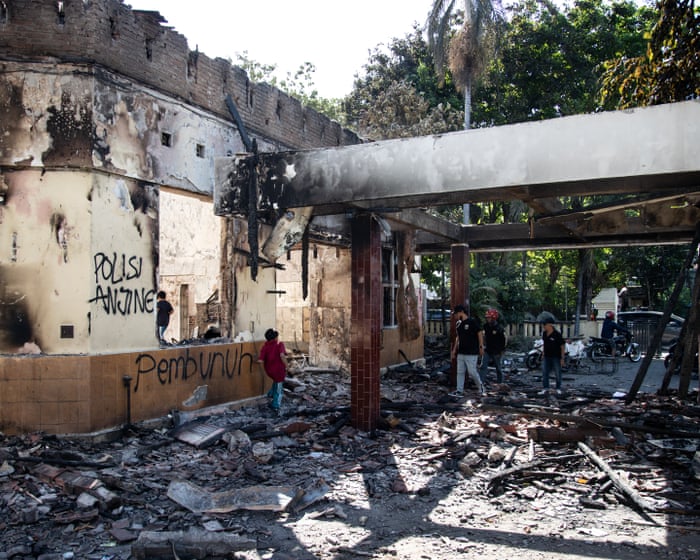Indonesian political parties have agreed to reduce certain benefits for lawmakers, including a contentious $3,000 monthly housing allowance, President Prabowo Subianto announced. The move comes as authorities increased security measures to curb protests that have swept the country for the past week.
Speaking at a televised news conference in Jakarta on Sunday, Prabowo, alongside leaders from eight political parties, stated that the housing allowance would be cut and overseas trips for parliament members suspended. Starting Monday, lawmakers will see these changes under a new moratorium—a concession intended to ease public anger.
Prabowo also said he had instructed the military and police to take strong action in response to the burning and looting of politicians’ homes and government buildings.
On Monday, police set up checkpoints throughout Jakarta and increased patrols to protect citizens and provide a sense of security, according to a police spokesperson.
Student and civil society groups called off protests on Monday, citing concerns about a potential crackdown by authorities.
The protests began a week ago, initially driven by public outrage over the pay and perks given to lawmakers. The housing allowance alone amounts to 50 million rupiah ($3,075)—nearly ten times Jakarta’s minimum wage. Tensions escalated further after a 21-year-old motorcycle taxi driver, Affan Kurniawan, was run over and killed by a police vehicle at a protest site on Thursday. A video of the incident sparked widespread anger toward security forces.
Witnesses reported that an armored police vehicle suddenly accelerated through a crowd of demonstrators, striking and killing Kurniawan, who was reportedly attempting to complete a food delivery at the time.
Prabowo has promised an investigation into the killing and pledged support for Kurniawan’s family. Seven officers have been detained in connection with the incident.
The death toll from the unrest rose to six after Amikom Yogyakarta University confirmed that 21-year-old student Rheza Sendy Pratama died during protests on Friday. The circumstances of his death remain unclear.
In the eastern city of Makassar, at least three people were killed on Friday when protesters set fire to a council building. Another person died after being beaten by a mob on suspicion of being an intelligence officer.
Protests have occurred in multiple cities, including Yogyakarta, Bandung, Semarang, Surabaya, and Medan.
Prabowo reiterated that his government respects freedom of expression as guaranteed by Indonesia’s constitution and international agreements. However, he warned that when protests turn violent—damaging public property, endangering lives, or attacking homes and institutions—they become serious legal violations. He cautioned that such acts could be considered treason or terrorism and stated that the state would not tolerate attempts to destabilize the country.
Looters have targeted the homes of politicians and government buildings, including a property belonging to Finance Minister Sri Mulyani Indrawati. She was not present at the time, and it is unclear how often she uses the residence.
The ongoing crisis led Prabowo to cancel a planned trip to China for a military parade marking the end of World War II.TikTok, which has over 100 million users in Indonesia, temporarily suspended its live feature in response to protests.
The Alliance of Indonesian Women, a coalition of women-led civil society groups, postponed a planned protest at the parliament on Monday, citing concerns about a potential crackdown by authorities. In an Instagram post on Sunday, the group stated, “The delay is to prevent further violent escalation by authorities … and will continue until the situation calms down.”
Student groups also called off a protest scheduled for Monday, with one umbrella organization explaining the decision was made “due to extremely unfavorable conditions.”
—Associated Press
Frequently Asked Questions
Of course Here is a list of FAQs about the Indonesian president cutting lawmakers benefits in response to protests with clear and concise answers
General Understanding Background
Q What is this about I heard there were protests in Indonesia
A Yes there were large studentled protests against a new law that critics said weakened the national anticorruption agency In response President Joko Widodo announced he would cut the benefits and allowances for members of parliament to ease public anger
Q Why were people protesting
A The main reason was the passing of a controversial law that revised the powers of the Corruption Eradication Commission Many people saw this as a move by politicians to protect themselves from corruption investigations which sparked widespread public outrage
Q What does cutting lawmakers benefits actually mean
A It means reducing the extra money and perks that members of parliament receive on top of their official salary This can include things like allowances for housing transportation meetings and official travel
About the Presidents Decision
Q Why did the president decide to cut their benefits
A It was a direct response to the public protests The move was intended as a symbolic gesture to show that the government was listening to the peoples frustrations about political elites and was willing to make a sacrifice to calm tensions
Q Did the president have the power to do this unilaterally
A Not exactly The president can propose and order the cuts but the formal approval and implementation often involve the Ministry of Finance and the parliaments own internal bodies It required a level of cooperation from the lawmakers themselves
Q How much money will this actually save
A While the exact figure wasnt immediately announced the savings are largely symbolic The total amount is a tiny fraction of the national budget The main goal was to make a political statement not to fix the national finances
Impact and Reactions
Q Will this solve the problem and stop the protests
A It was seen as a first step to deescalate the situation but it did not address the core demand of the protesters repealing the new KPK law For many it was a welcome gesture but not a complete solution
Q How did the lawmakers react to having their benefits cut
A



